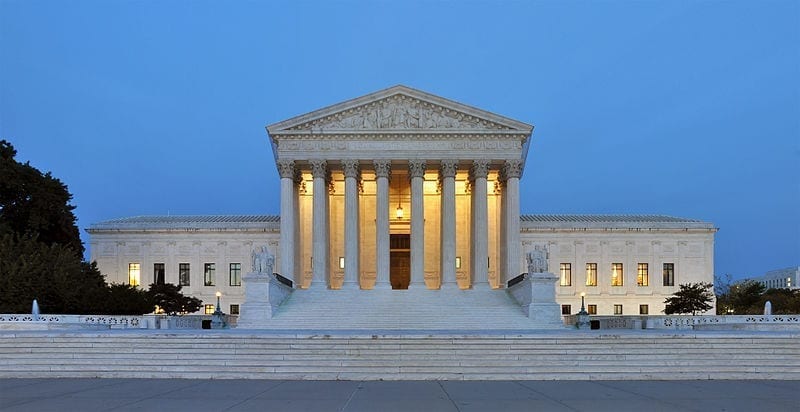While the 5-4 conservative majority didn’t remark on the case, they did issue a condemnation of the sorts of “universal injunctions” which blocked the rule from taking effect.
The Supreme Court’s conservative majority will allow the Trump administration to advance its “Public Charge” rule, which denies green cards and citizenship to migrants who’ve used or are using government welfare.
The court’s 5-4 ruling, supported by recently appointed Justices Brett Kavanaugh and Neil Gorsuch, provides no explanation as to why the panel decided to lift preliminary injunctions instituted by lower courts. However—and without addressing the specifics of this particular case—Gorsuch and a colleague, Justice Clarence Thomas, issued a concurring condemnation of “universal” injunctions.
“It has become increasingly apparent that this court must, at some point, confront these important objections to this increasingly widespread practice,” Gorsuch wrote. “As the brief and future history of the regulation before us illustrates, the routine issuance of universal injunctions is patently unworkable, sowing chaos for litigants, the government, courts, and all those affected by these conflicting decisions.”
“I concur on the court’s decision to issue a stay,” he added. “But I hope, too, that we might at an appropriate juncture take up some of the underlying equitable and constitutional questions raised by the rise of nationwide injunctions.”
In the meantime, though, challenges against the proposed rule will continue in courts across the country.

According to The New York Times, the “Public Charge” rule was announced last August. Under its purview, immigration officers could deny permanent legal status to immigrants who have either used or are likely to use public benefits. In the past, notes the Times, “only substantial and sustained monetary help or long-term institutionalization counted,” with less than a percent of migrants being rejected on grounds of being a burden.
But under Trump, the definition of “public charge” has been expanded significantly. The occasional use of food stamps—or enrolment in Medicaid—could leave otherwise legal immigrants vulnerable, unable to obtain a job or regularize their residency.
During proceedings, New York Solicitor General Barbara D. Underwood suggested that, if approved, the “Public Charge” rule would pose a drastic diversion from longstanding precedent.
“The rule’s vast expansion of ‘public charge’—to include employed individuals who receive any amount of certain means-tested benefits for even brief periods of time—is a stark departure from a more-than-century-long consensus that has limited the term to individuals who are primarily dependent on the government for long-term subsistence,” Underwood said.
“’Public charge’ has never included […] employed persons who receive modest or temporary amounts of government benefits designed to promote health or upward mobility,” she added.
Several states, counties and cities have also sued the administration over the revision, arguing that scaring migrants off benefits would adversely affect children and single mothers while shifting the burden of care to institutions with fewer financial means than the federal government. And, as LegalReader.com reported before, others note that few migrants qualify for many, if any, forms of welfare.
While the administration has faced numerous legal challenges—with critics calling many of Trump’s proposals inhumane—the conservative-ruled Supreme Court has allowed many White House immigration policies to proceed uncontested.
In September, for instance, the justices permitted new restrictions on Central American migrants seeking refuge in the United States. One month before, the Supreme Court allowed the administration to begin using money originally intended for the Pentagon to construct a wall along the U.S.-Mexico border. And in 2018, the panel opted to uphold aspects of Trump’s travel ban against North Korea, Venezuela and several Muslim-majority countries.
Sources
Supreme Court Allows Trump’s Wealth Test for Green Cards
Trump restrictions on immigrants who use public benefits OK’d by conservatives on Supreme Court


Join the conversation!